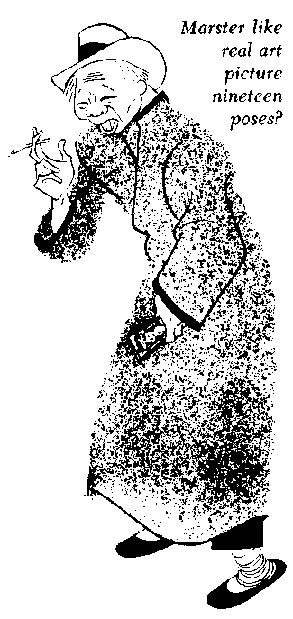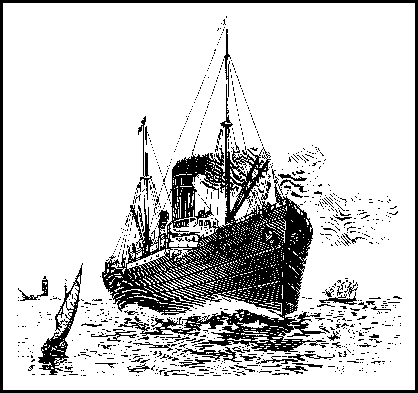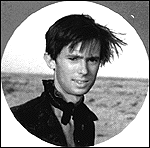In the World
Hugo Williams
(Akadine --- Common Reader)
 For those of us fortunate enough to be addicted to books, the Garden of Paradise is the Times Literary Supplement. It lets you in on the most exotic of exotica of the book-
For those of us fortunate enough to be addicted to books, the Garden of Paradise is the Times Literary Supplement. It lets you in on the most exotic of exotica of the book-The writer Hugo Williams appears once or twice a month in TLS, on the "Commentary" page. He writes slyly about poetry conferences here or there (sometimes with attendance in the low teens), or memories of his eccentric actor father, or growing up hip in England, or travels to his cottage in France, or the peculiarities of visiting New York.
Once, a description of living in Franco Spain came so close to my own experience that I sat down and wrote him a letter. I told him I was President of the South-East Burbank Hugo Williams Fan Club, and I invited him to visit to make a presentation.
I assured him that although we didn't have enough in the till to pay passage from London, that, after his reading, we would guarantee him a place in the Club's faded front room over the Hung Chu laundry, on the couch, next to the head of Milton (or was it Keats?) I also told him that we would also pay for a testimonial dinner with his local followers at a nearby Taco Bell.
He probably has so many fan clubs hither and yon that he hasn't yet had a chance to reply, but I want to assure him that this particular Fan Club is still going strong (although the head of Milton --- or Keats --- got lifted), and that the invitation still stands.
In 1962, Williams undertook to go around the world, by himself, with not much more than a suitcase and the brio that we had back then that made us think we could travel anywhere by any means whatsoever with little means, and still survive. Like many of us, he headed out across Europe, hitchhiking through the Middle East, down into India --- then by boat to Japan, got to Australia, and returned --- via the Pacific --- to England.
Some of us judge a travel book by a single criterion --- whether we'd like to be going along with the author. In Williams' case, we'd chose to join him in a trice, because he is fun, and smart --- but we wouldn't, even for a moment, consider his ridiculous itinerary. A truck across the desert from Jordan to Kuwait. Trains in India. By thumb through Australia. A terrible French pacqueboat across the Pacific. We suffer to travel, and we travel to suffer, even thought there are times when we luck out:
I caught the Teheran Express to Aznow where the buses leave for Isfahan. It was easier than I'd thought. People imagine the obstacles mount as you get further from home, but the hardest country of all to travel in must be England, where everyone thinks you're barmy if you don't speak English in the local dialect.
Williams is one of these people who, obviously, everyone cottons to. Maybe it's that he looks rather like an elf. For us, as his fellow travellers, within the covers of All The Time in the World --- we cotton to him because he sees things in a curious, bemused, observant, thoughtful, wide-awake way --- a view that get sharpened by the not-too-
All this talk about trains! But there's no way of avoiding them in India. They are part of the landscape. Half the population travels on them every day. Indians are essentially migrants. Their lives are pilgrimages. If there was a rail strike, God knows where the population of the trains would live. Williams' typewriter was stolen from the seat next to him. The story of him and policeman is a fine capsule of Indian life and times: "You see you shouldn't have gone to sleep" said the policeman later. "We must never go to sleep in trains...We live and learn. What did you say your name was?" I was witnessing the fabulous might of Indian bureaucracy as it shook its sleepy head, stepped into its trousers, spat out a gob of betel and selected the inevitable form for me to confess my guilt on. In the Far East, he meets the lovely and young Lily in a dance hall, moves with her for a while, and like most of us who find a tiny ledge of security while we are on the road, thinks about staying with her a long time, perhaps forever. We used to tell the time by the sun. Every few hours a woman came out on to her balcony opposite to move a bird-cage out of the shade. All day I sat about the sunny flat in a shirt and sarong, reading, or watching Lily stitching something. There was a pregnant cat living with her and when it lay in the sun you could see the little forms snuggling under its skin... At 9:30 every day they had to go to English classes, so after lunch I had to help them with their homework: "Pat is good because she works hard." "Pat works hard, therefore she shall be rewarded." Perhaps that was why Lily always insisted on referring to herself in the third person: "Lily doesn't like working at the club, therefore she shall not be rewarded," she said. Williams is poet. Anyone who can take the most barren part of Northern Australia, hitch-hike through it for day after dusty, bug-spotted, dirt-encrusted day, and make poetry out of it has to be a master poet --- at least, poet-in-prose: So far I have seen no emu, koala, brown snake, jack rabbit, or kangaroo. I turn around but they duck back down their burrows....Julia Creek, which is a town, not a landmark, has a thick coat of locusts over it. The cloud expired here last week and millions of flies are now settling on their crisp, stinking carcasses. There are heaps of them beneath every lamp post, on every window sill, on roofs, and in the gutters. They chose a good place to die. This town is a necropolis. There is a sour look about it. The buildings seem vaguely rancid, the trees petrified, the dogs mangy, and the inhabitants all seem to have the death-wish upon them. It is 6 pm. We hang out our thumbs. Flies come at us like reporters around an accident...No cars to be had, so we sleep on the cracked, locust scattered earth outside of town. And, like some of us when alone and not knowing what comes next, deciding (what is there to lose?) out of the blue, to meet someone you've always admired, from a distance. Williams looks up the director Satyajit Ray in Calcutta, calls him, ends up with an appointment, arrives "half an hour early and had to hang about on the street outside, the only person wearing a tie in the neighborhood," talks to him, finds him courteous to this young vagabond who had come on pilgrimage, 10,000 miles, to honor a hero. And the omnipresent journal --- we all keep journals, don't we? For sometimes, it's the only friend we have to talk to; writing, writing, on buses, in train stations, on curbs, in cafes, in dirty beds in dark hotels, always writing, writing about writing, and thinking, and travelling, your thoughts catching you up, turning you into travelling philosopher, where you can wonder about wondering (you have time for that, after all --- all the time in the world), so you start thinking about thinking, imagining imagination --- even questioning the whole silly circle of the lonely brain: I wanted one last day alone in Nara, just to hang about and write. But how do you do it? You can either stay still and write about other people, or you can move about and enjoy yourself. I doubt whether you can write about yourself moving about and enjoying yourself. Consciousness is too unreasonable. It is like a great surface which things jab upon and across at random, some things falling only from the imagination. There is no form to it because there is no end to the imagination. Imagination is stupidity and ignorance, intelligence and knowledge, indefinably mixed forever. But what can you do about it? You've always been taught to fight down stupidity and ignorance, to cover them up with what you are sure of. So the picture you paint will always be false, painted by reason and conscience, instead of consciousness. That's what makes it so hard. All the Time in the World came out in 1966, not long before Paul Theroux's The Great Railway Bazaar: By Train Through Asia. Theroux got rave reviews for his wit, his sense of realism, his "humanity and compassion" (V. S. Pritchett). Rereading it two decades later, one discovers the author is sometimes observant, fun, funny, but more often crabby, sneering, somewhat of a whiner. During the last leg of his journey, on the Trans-Siberian Railway, the author turns manic, scowling at his seat mates, fuming at the slowness of the trip, howling at the steppes of dark Russia, ending up in a fist fight with the dining-car steward. Hugo Williams pieced together out of his around- Life on board the Oceanien was like some terrible bed- He travels as we all seemed to travel back then --- probably as the kids still do. Getting drunk, maybe getting in a fight or two. Riding on scooters, trains, buses, boats. Talking with loonies here or there. Having beggars pawing at you, and feeling bad. Being surprised by the unchanging social perfection of a whole country like Japan. Missing a train, missing a boat, missing a ride, ending up sleeping in the street, in the station, on the ground. Getting depressed, being lonely, hating it, hating it --- and at the same time, knowing you are living, that this is what it is like to be gone, on the road to nowhere. Except the next spot on the map.
He travels as we all seemed to travel back then --- probably as the kids still do. Getting drunk, maybe getting in a fight or two. Riding on scooters, trains, buses, boats. Talking with loonies here or there. Having beggars pawing at you, and feeling bad. Being surprised by the unchanging social perfection of a whole country like Japan. Missing a train, missing a boat, missing a ride, ending up sleeping in the street, in the station, on the ground. Getting depressed, being lonely, hating it, hating it --- and at the same time, knowing you are living, that this is what it is like to be gone, on the road to nowhere. Except the next spot on the map. "I was either in a stupor or furious," Williams tells us of the ending, the ending of the journey which must be like so many endings. But instead of showing a sour side, he turns bemused philosopher: "I believe I shall be writing home about this trip for the rest of my life. I think I may easily develop a mania to be heard out and may well be seen, years from now, still recollecting, like an old white hunter, shadowy images to an empty fireplace, far into the night."
"I was either in a stupor or furious," Williams tells us of the ending, the ending of the journey which must be like so many endings. But instead of showing a sour side, he turns bemused philosopher: "I believe I shall be writing home about this trip for the rest of my life. I think I may easily develop a mania to be heard out and may well be seen, years from now, still recollecting, like an old white hunter, shadowy images to an empty fireplace, far into the night."
- Note:
The publisher advises us that this book is only available through The Common Reader. We urge you to look at their selection of books, and have them send you their print catalogue. They carry outstanding, unusual, and hard-to-find titles --- and give expansive reviews to their favorite works.